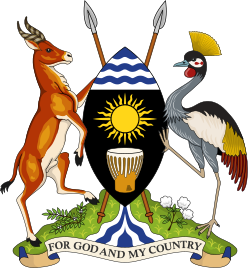 |
|---|
This article lists the ministers of foreign affairs of Uganda since the country gained independence from the United Kingdom on 9 October 1962. [1] [2]
 |
|---|
This article lists the ministers of foreign affairs of Uganda since the country gained independence from the United Kingdom on 9 October 1962. [1] [2]
| No. | Name | From | To | Notes |
|---|---|---|---|---|
| 1 | Milton Obote | 1962 | 1966 | Sam Odaka was minister of State from 1964 to 1966 [2] |
| 2 | Sam Odaka | 1966 | 1971 | |
| 3 | Joshua Wanume Kibedi | 1971 | 1973 | |
| Paul Etyang | 1973 | 1973 | In acting capacity | |
| 4 | Michael Ondoga | 1973 | 1974 | |
| 5 | Princess Elizabeth of Tooro | 1974 | 1974 | Princess (Batebe) of the Tooro Kingdom |
| 6 | Idi Amin | 1974 | 1975 | First tenure; Juma Oris served as acting minister during this time [3] |
| 7 | Juma Oris | 1975 | 1978 | |
| 8 | Idi Amin | 1978 | 1979 | Second tenure |
| 9 | Juma Bashir | ? | 1979 | Last foreign minister under the Amin regime; fled to Juba (then in Sudan) during the Uganda–Tanzania War [4] [5] |
| 10 | Otema Allimadi | 1979 | 1979 | |
| 11 | Godfrey Binaisa | 1979 | 1979 | |
| 12 | Otema Allimadi | 1979 | 1980 | |
| 13 | Milton Obote | 1980 | 1985 | |
| 14 | John Luwuliza Kirunda | 1985 | 1985 | |
| 15 | Olara Otunnu | 1985 | 1986 | |
| 16 | Ibrahim Mukiibi | 1986 | 1988 | |
| 17 | Paul Ssemogerere | 1988 | 1994 | |
| 18 | Ruhakana Rugunda | 1994 | 1996 | |
| 19 | Eriya Kategaya | 1996 | 2001 | |
| 20 | James Wapakhabulo | 2001 | 2004 | Died in office |
| Tom Butime | 2004 | 2005 | In acting capacity | |
| 21 | Sam Kutesa | 2005 | 2014 | |
| Henry Oryem Okello | 2014 | 2015 | In acting capacity while Sam Kutesa was President of the United Nations General Assembly | |
| 22 | Sam Kutesa | 2015 | 2021 | |
| 23 | Jeje Odongo | 2021 | Incumbent |